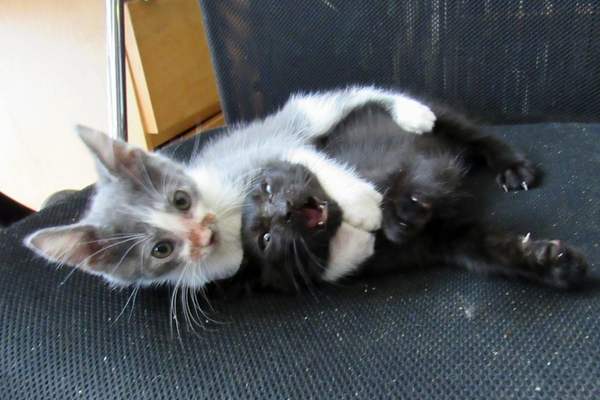Cats can be extremely unpredictable, but there is one behavior that stands true throughout the cat kingdom and that is their consistent activity at night. If you’re a cat owner you are probably used to the 2 am sprints down the hallway or the toe bites at midnight; but there is nothing quite like waking up to the sound of your cats hissing and meowing in a rage towards one another.
So why do my cats only fight at night? The most likely reason is that cats are crepuscular creatures who are competing in a small territory, but it could also be because your cats are challenging the household hierarchy, or your cat didn’t get enough exercise during the day.
In this article, we’ll discuss the variety of reasons why your cats might be fighting at night and some things you can do to alleviate the fighting and help you get back your peaceful nights.
Crepuscular Cats

Modern house cats who now have their meals brought to them each day can sometimes be mistaken as less than wild; however, domestic cats have retained their instinct to hunt at night, and with that comes natural competition between your felines when the lights go out.
At home during the day you’ll often find your cats cuddling, sleeping, and playing peacefully; but night time brings out their inner lion and competitive instincts.
If you’re constantly hearing your cats fighting during the night, it’s quite possible that they are on the hunt and feeling the competition between one another as they practice their night time hunting techniques throughout your home.
Fighting cats at night could also be a territorial fight. If you have recently introduced a new cat to your home you have now shrunk the original cat’s territory. The more cats you add to the home, the more pressure each cat feels to claim its territory.
Cats claim their territory by releasing pheromones on their turf. If you see a cat chin-rubbing the couch or the dining room chairs, they’re releasing pheromones that bring them comfort and security to know that the area is theirs for hunting.
Cats can claim an entire home as their territory or just a few rooms in the house. However, if another cat is impeding on their turf, there may be some night time battles to set the record straight.
Although the night time fighting might be frustrating to you as an owner, it’s important to be patient and remember that this issue will not be resolved overnight. But thankfully, there are some things you can do to help your cats feel more in control and safe in their territories.
Start by doing a few of these things to help your cat feel more secure and in control of their territories:
- If you have a cat that has reached social maturity, you might consider separating them from the other cats.
- Get rid of that “new cat smell” by integrating cat smells. You can do this by simply rubbing a towel on one of the cats and then rubbing that same towel on the new cat.
- Provide all cats with the same amount of attention and affection.
- Avoid raising your voice or using negative reinforcement techniques to stop the fighting.
- Consider getting each cat their own cat tree, food bowl, and litter box.
- Help your cats relax before bedtime by showing extra affection, sitting with them for a while, or by placing them in their happy place on their favorite blanket.
Household Hierarchy

Did you know that cats establish their hierarchy in the household? Many pet owners find this fact mind-blowing, but for cats, it’s natural to have a superior cat or a leader of the pack. Another interesting fact is that this established hierarchy can change at any time.
The change in a hierarchy may stem from many things but a few of the most common changes are when humans move in or out of the household, the amount of affection you’re giving each cat if you or the cat are battling an illness, or a change in a regular household routine.
Although most of these things are out of our control, it often has a large impact on the leadership of the cats in your home. It’s important as cat owners that we keep these things in mind because these changes most likely contribute to night time activeness and altercations.
Although we have little control over this aspect of cat behavior and tradition, there are some things we can do as cat owners to assist in healthy cat behavior in the meantime. Here are some things you can try to ease the fighting between your felines:
– Do not react to your cat’s altercations unless you feel that it’s getting too heated.
This means not only controlling the tone of your voice in these situations, but also your body language.
– Try purchasing a synthetic feline pheromone spray.
Cat pheromones help the cats feel safe and secure in their home. By adding these familiar smells to their surrounding areas, it may help decrease their behavioral problems.
– Give your cats positive praise when they are all together and things are peaceful.
You could give them extra petting, treats, or anything that brings them joy.
– Provide a space for each cat that is their own.
Take the space where each cat spends most of their time and let them make it their own by adding things such as blankets, food, and toys they enjoy.
Cat Calisthenics

In addition to cat instincts, territorial battles, and the household hierarchy, your cats might also be fighting at night because they didn’t get enough exercise during the day. As cat owners, we are often obsessed with how cute it is that our cats are always sleeping, but a lack of exercise during the day could be leading to their behavioral problems in the wee hours of the night.
Although it may be tough on your schedule, you must spend time playing with your cats or provide them with the toys and equipment they need to stay active during the day.
Like humans, exercise is an important part of any house pet’s daily routine. Not only is it excellent for their health and longevity, but it’s also crucial to battling those middle of the night cat attacks.
If you have younger cats and kittens, more than likely they’re active during the day because of their age. However, if you have older cats, exercise might be more of a challenge without some human intervention; as cats tend to be less active with age.
Here are some examples of activities you can do with your felines to ensure a more productive daytime routine:
- You might be working away from the home during the day, but if you’re home for lunch spend a few minutes playing with your cats before you leave for work, at lunchtime, and when you get home from work.
- Find an exercise wheel or cat toy that promotes healthy exercise.
- Grab a laser or interactive toy that will tire out the cats about an hour before bedtime.
How to Stop Cats From Fighting at Night
A recommended strategy involves allocating individual resources for each cat, including dedicated food and water bowls, litter boxes, and resting areas. This helps diminish competition and minimizes potential triggers for conflicts among feline companions.
Additionally, incorporating interactive play sessions for the cats before bedtime proves beneficial, as it aids in expending their energy levels, thereby reducing the likelihood of nighttime conflicts. Establishing a serene and enriching environment plays a pivotal role, and the integration of pheromone products designed to mimic natural cat odors can further contribute to alleviating tension and mitigating aggression between cats.
A Last Resort
Although it’s rare, there are cases where extra help and support may be necessary to assist in ending the battle between your cats. If you feel that you have been patient and tried multiple techniques to soothe your cats at night, then it may be beneficial to visit a veterinary clinic and ask about your options when it comes to prescription behavioral medication.
Explain to your veterinarian that you have tried to calm your cats, but they simply refuse to get along and see which other options are available per their advice. Perhaps, it can be a short term solution to the problem until your cats feel more comfortable in their space.
Conclusion
Cats are complex creatures who have commonly been misunderstood and frankly impossible to predict; however, there are some simple things we can do as cat owners to help our cats feel more safe and secure, and in turn, alleviate the nighttime-fighting.
Nighttime fighting between cats is a common complaint among cat owners, but it doesn’t mean it has to last forever. The important thing is to be patient with them and provide them with the necessary items they need to feel safe enough to cease fighting.
By simply understanding your cats, providing them with comfort items and exercise, and being patient with them, you can find a solution to rid your home of the midnight catfights and gain a peaceful nights’ sleep once again.

